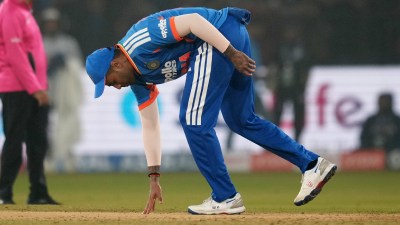UPA looks on as LTTE flies high
Any credible diplomatic effort must necessarily involve sustained pressure on both parties to the conflict. Only India can achieve this

As the dramatic use of air power by the Liberation Tigers of Tamil Eelam makes headlines, there is no reason to believe that New Delhi is surprised. Other than Colombo, New Delhi is perhaps the one government that is acutely aware of the
significant upgrade of LTTE8217;s capabilities in recent years.
That the Tamil Tigers were gearing up for air attacks was evident from news reports earlier this month that the Sri Lankan Navy had intercepted ships carrying spare parts and other equipment for the fledgling Tiger Air Force. The LTTE8217;s successful development of an air force 8212; it has long had an impressive naval capability 8212; is less shocking than the current political reality in New Delhi. It is the UPA government8217;s policy paralysis that lets the LTTE, which India declared as a terrorist outfit long ago, evolve into a monster.
No political formation in India has a bigger grievance against the LTTE than the Congress Party: the murder of former prime minister, Rajiv Gandhi. Yet it is the Congress-led coalition that has adopted such a dangerously permissive policy towards it. The UPA8217;s problem is not a lack of awareness of the extraordinary threat posed by the LTTE8217;s expanding military capabilities or the many dimensions of the Sri Lankan crisis. External Affairs Minister Pranab Mukherjee is aware of the intensity of the Congress sentiments and, in his recent capacity as India8217;s defence minister, should be on top of Indian intelligence on the LTTE. National Security Advisor, M.K. Narayanan, who served as the chief of Intelligence Bureau in the late 1980s when India intervened in Sri Lanka, holds much of the nation8217;s institutional memory on the evolution of the LTTE. Indian Foreign Secretary Shivshankar Menon was India8217;s high commissioner to Colombo less than a decade ago.
Two factors have hobbled the UPA as the peace process unravels in Sri Lanka. One is its political fear of offending the coalition partners from Tamil Nadu, and the other is in letting the Mahinda Rajapakse government 8212; which is chasing the illusion of a military solution to the ethnic conflict 8212; believe that it can take India for granted.
Historically all governments in New Delhi have had to take into account Tamil political sensitivities in dealing with the civil war in Sri Lanka. But few governments have sunk to the depths of such a pre-emptive appeasement of Tamil coalition partners. Whether it is in letting its allies proceed with the controversial Sethusamudram project or in failing to take timely steps to counter the LTTE, the UPA government has chosen to abandon its national responsibilities rather than invite any political trouble in the coalition.
The NDA, too, had its partners from Tamil Nadu. But in conducting its policy towards Sri Lanka, the Atal Bihari Vajpayee government was willing to explore sophisticated options. When the Sri Lankan crisis re-erupted in 2000, Vajpayee moved quickly with arms supplies to Sri Lanka, but also pressed Colombo to embark on a negotiation with the Tamil Tigers. This even-handed policy helped strengthen the basis for a peace process.
Thanks to the UPA government8217;s hands-off policy, India is losing ground in both camps. In putting the defence cooperation agreement with Sri Lanka, negotiated during the final months of the NDA government, in cold storage, it has forsaken its influence with Colombo on the key issue of weapons supplies to its army at war. Sri Lanka has now turned to Pakistan and China for its weapons needs. Defence Minister A.K. Antony has informed us recently that India is yet to take a decision on coordinated naval patrolling with Sri Lanka. Without the active deterrence from the Indian Navy, the LTTE is free to reinforce its own military capabilities. More consequentially, the LTTE appears convinced that the UPA has no political stomach for an argument, let alone a contestation on Sri Lankan policy, given its political allies in Tamil Nadu.
No one underestimates the inherent complexity of the Sri Lankan crisis. Any credible diplomatic effort must necessarily involve sustained pressure on both parties to the conflict. Only India has the political and military leverage with both Colombo and the LTTE. But the UPA government appears afraid of even trying.
The LTTE8217;s acquisition of air power marks the first of the many potential national security costs to the nation from the UPA8217;s 8216;do nothing8217; policy in Sri Lanka.
The writer is a professor at the Rajaratnam School of International Studies, Nanyang Technological University, Singapore
- 01
- 02
- 03
- 04
- 05































